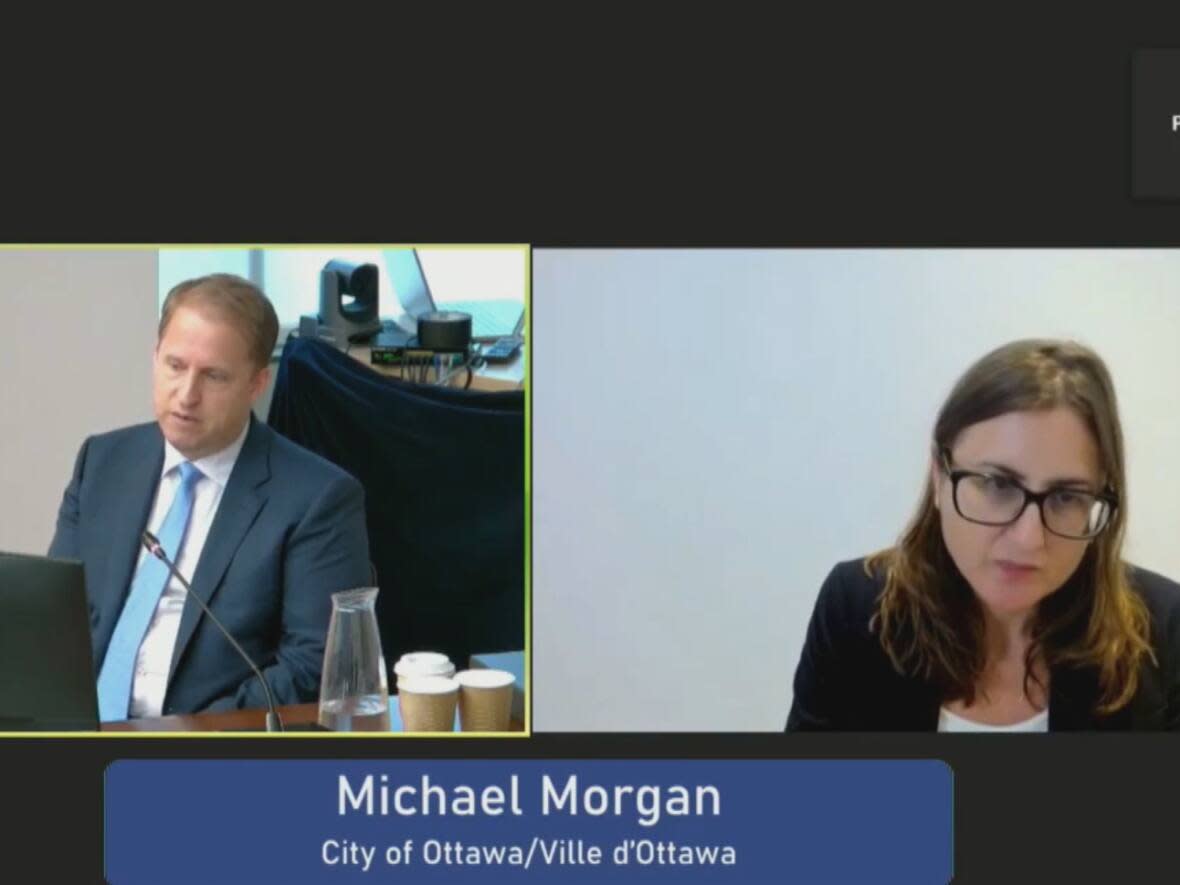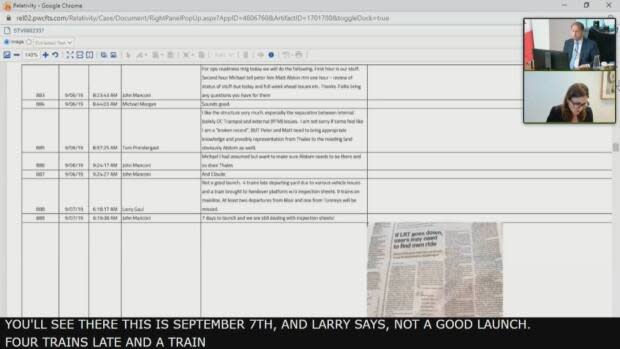Text messages show Manconi was 'stressed' about trains in days before official opening

City officials were stressed about how the LRT and its trains were working in the days before the official opening on Sept. 14, 2019, new documents introduced at the public inquiry into the Confederation Line reveal.
Several threads of conversations in a large group chat among city transit officials and their consultants on the WhatsApp messaging platform were entered into the evidence on Monday, indicating Mayor Jim Watson and former transportation GM John Manconi were worried about how the public opening was going to go.
"If we need to run those trains in manual mode we are trained up for that correct? I need everyone to think plan b, c and d. Cancellation of launch is not an option," Manconi wrote to four members of this team the evening of Sept. 12 — less than 48 hours before the public launch.
The next morning, according to the message thread, the system was short two trains because daily inspection sheets were missing — an issue that had been occurring for more than a week.
The previous week, a problem with three radio transmitters led to a 10-hour shutdown of the western half of Ottawa's new LRT system. The city didn't know why it had happened.
"Folks, mayor is not happy with yesterday. He was asking why 10 [hours] to reset the radios," Manconi messaged the group on Sept. 5.
'These issues are stressing me out'
Two days later, Larry Gaul from the city's rail office, told the group on WhatsApp at 6:15 a.m. on Sept. 7, 2019, that the morning was "not a good launch. Trains late departing yard due to various vehicle issues and a train brought to handover platform w/o inspection sheets. Nine trains on mainline. At least two departures from Blair and one from Tunney's will be missed."
WATCH LIVE | Day 11 of the inquiry:
Manconi responded in apparent frustration: "Seven days to launch and we are still dealing with inspection sheets!"
On Sept. 7, Manconi told the group: "These issues are stressing me out. Can you guys tell me if we were in service what would the impact be? Would customers be stuck? Transferring transit? Delays? Etc?"
Another member of the group responded that whatever issues were happening that day would have resulted in a five-minute delay to customers between Blair and Tremblay, and another issue would have resulted in a five-minute gap in service.
The messages — which have not yet been made available to the public in full — add to the underlying theme of the inquiry so far, which appears to show that everyone from Rideau Transit Group and its construction arm, to train-maker Alstom, to the city and its own consultants knew about reliability issues with the LRT.
The documents were entered as part of the commission's interview with the city's rail director Michael Morgan, who was part of the WhatsApp chat group, although he didn't have a record of the messages because his phone had been "reset."
Trial criteria not in contract
Morgan, a career engineer, gave hours of testimony about the city's oversight of the LRT. He joined the city in 2017 as part of the planning for the Stage 2 extension, bringing with him experience from urban rail systems from around the world. He was made the rail director in 2019 when the former rail director, Steve Cripps, retired.
He spoke about how there were odd issues with the contract, such as the fact that the substantial completion and handover dates were distinct events and each brought with them big paydays. Morgan observed that other contracts have just one "end" day, usually after the trial running.
He also pointed out, as have other witnesses, that the contract didn't include the criteria for a passing score during the 12 consecutive days of trial running, which meant the city and the consortium had to figure it out for themselves.
The commission has heard several times how the criteria for the trial runs changed midway through the full-service test in August 2019, making it easier to pass.
The project director for RTG's construction arm, OLRT Constructors, told the commission on Friday that it was Manconi who suggested lowering the criteria.
Morgan said there were discussions including Manconi and RTG then-CEO Peter Lauch about reverting to an early 2017 version of the criteria. The city had agreed to both versions of the scoring.
Commission co-lead counsel Christine Mainville suggested that the changes to the scoring were made because the the Confederation Line was struggling to meet the more stringent 2019 criteria.

Morgan equivocated, saying the city was trying to be "collaborative."
After some back and forth, Mainville pointed out that RTG had agreed to meet a higher measure of performance.
"Why would the city want to compromise that?"
"Well, we didn't want to compromise it," said Morgan. "We had another set of criteria that we put forward that we had agreed that were sufficient to meet the service expectations. We were advancing that."
Testimony on Monday morning also showed that the scoring during the trial running was being discussed with people outside the scoring team, which the inquiry has heard was not allowed.
The commission was also scheduled to hear from city super-consultant Brian Guest.

 Yahoo Movies
Yahoo Movies 
